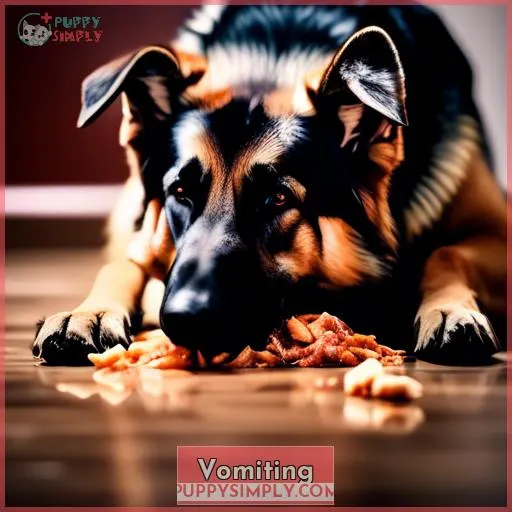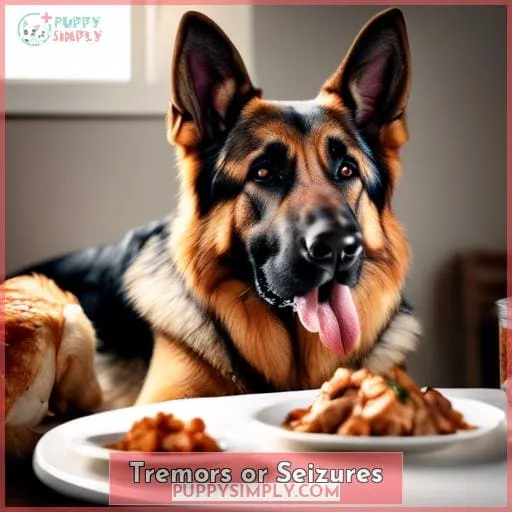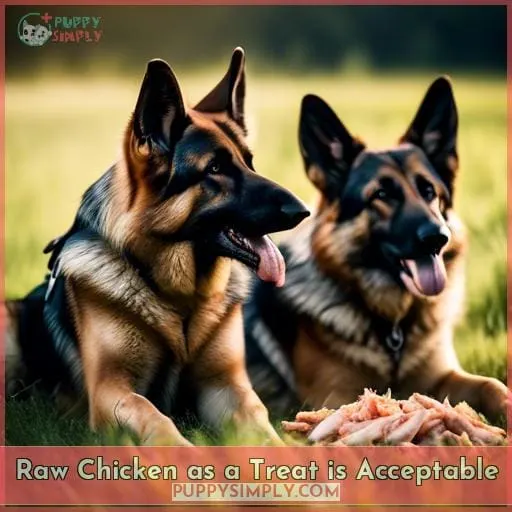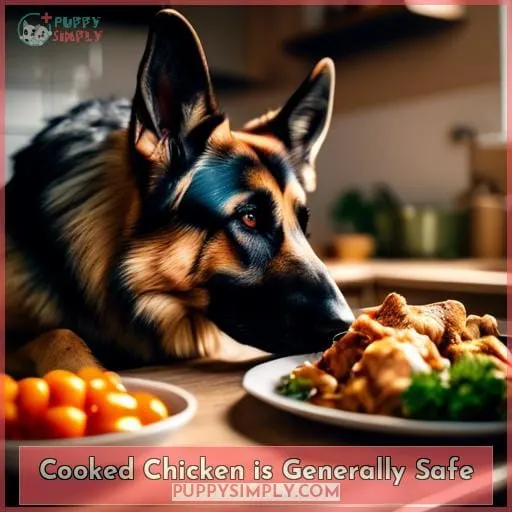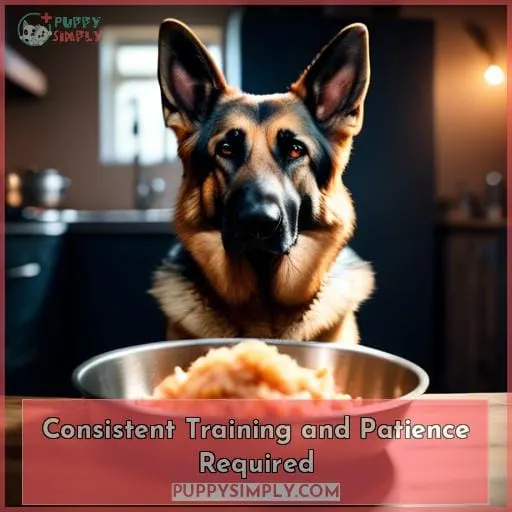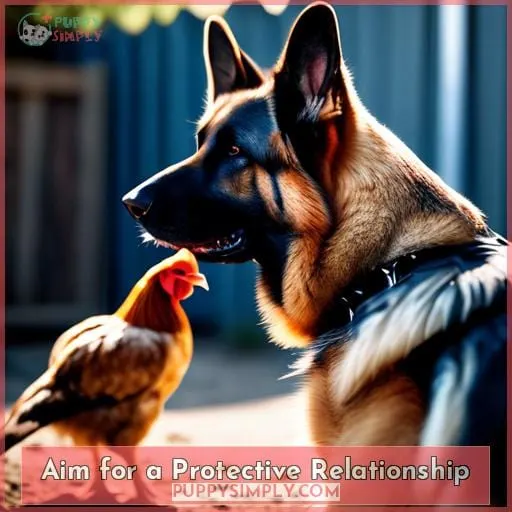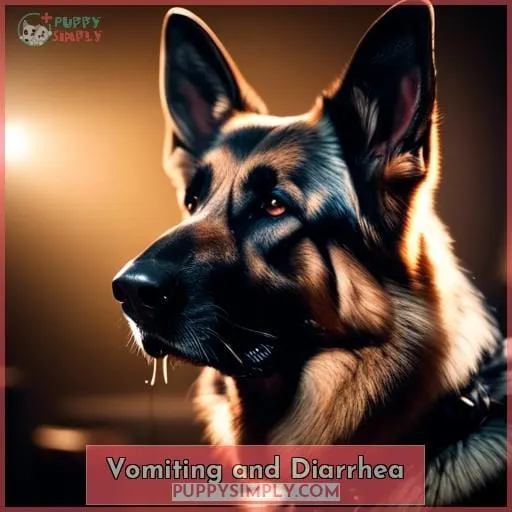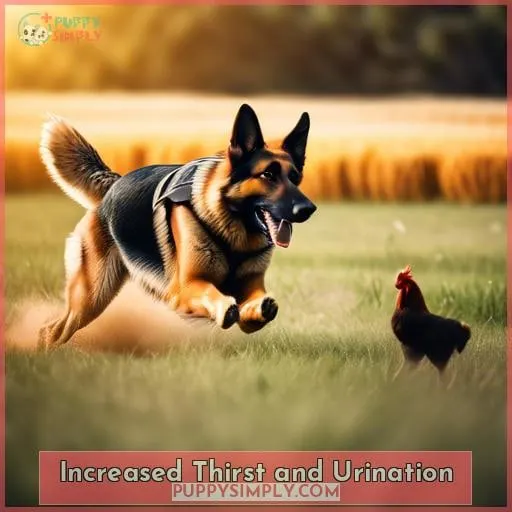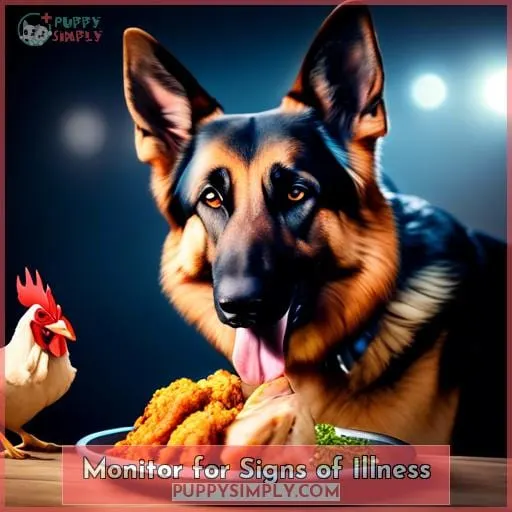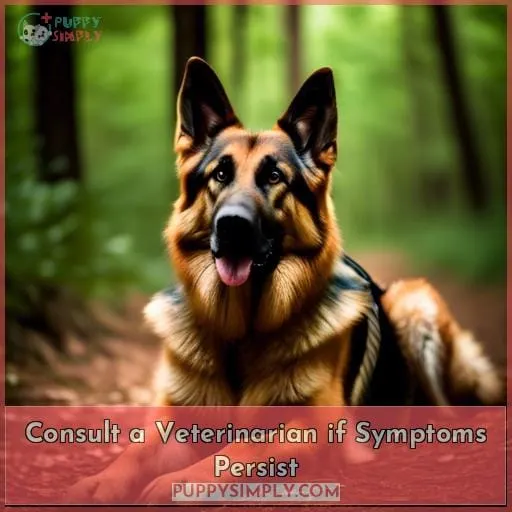This site is supported by our readers. We may earn a commission, at no cost to you, if you purchase through links.
 Can German Shepherds eat chicken? It’s a common question among dog owners.
Can German Shepherds eat chicken? It’s a common question among dog owners.
The answer is yes, German Shepherds can eat chicken, but there are a few things you need to know before you give it to your dog.
In this article, we’ll discuss:
- The benefits and risks of feeding chicken to German Shepherds
- How to prepare it safely
Table Of Contents
- Key Takeaways
- Vomiting
- Diarrhea
- Lethargy
- Tremors or Seizures
- Ataxia or Wobbly Episodes
- Raw Chicken as a Treat is Acceptable
- Raw Chicken as Part of a Diet Requires Caution
- Cooked Chicken is Generally Safe
- High Sodium Content Can Cause Health Issues
- Garlic and Onion Toxicity From Seasonings
- Potential for Pancreatitis
- Start With the Dog on a Leash
- Reward Calm Behavior
- Gradually Increase Exposure
- Consistent Training and Patience Required
- Use Positive Reinforcement
- Aim for a Protective Relationship
- Vomiting and Diarrhea
- Increased Thirst and Urination
- Neurological Signs in Severe Cases
- Avoid Toxic and Harmful Foods
- Monitor for Signs of Illness
- Consult a Veterinarian if Symptoms Persist
- Frequently Asked Questions (FAQs)
- How can I tell if my German Shepherd has eaten something toxic?
- What should I do if I think my German Shepherd has eaten something poisonous?
- Is it safe to feed my German Shepherd raw chicken as a treat?
- Can my German Shepherd eat cooked chicken every day?
- What should I do if my German Shepherd eats chicken bones?
- Conclusion
Key Takeaways
- German Shepherds can eat chicken, but it’s vital to consider factors like cooking it thoroughly, avoiding seasonings and high sodium content, and starting with occasional treats.
- Feeding chicken has benefits like protein, skin and coat improvement, and tastiness, but risks include bacteria in raw chicken, toxic seasonings, sodium issues, choking hazards, and pancreatitis risk from high-fat sauces.
- Prepare chicken safely by cooking it thoroughly, removing bones, avoiding seasonings and high sodium content, freezing for at least 24 hours, and grinding or cutting into small pieces.
- Watch for signs of illness after feeding chicken, like vomiting, diarrhea, lethargy, tremors or seizures, and ataxia or wobbly episodes.
Vomiting
You’ll want to watch out for vomiting, which could indicate food toxicity in your German Shepherd.
Vomiting can be a sign of:
- Electrolyte imbalance
- Dehydration
- An underlying medical condition
If your German Shepherd vomits more than once or twice, it’s important to take them to the vet right away.
Vomiting can also lead to:
- Weight loss
- Abdominal pain
- Bloody stool
If your German Shepherd vomits after eating chicken, it’s possible that they’re allergic to chicken or that they’ve eaten something harmful, such as a piece of cooked chicken bone.
If your German Shepherd vomits after eating chicken, it’s important to take them to the vet right away.
Diarrhea
You’ll experience diarrhea if you ingest too much chicken, especially if it’s raw or undercooked.
The high fat content in chicken can irritate your intestines, leading to loose, watery stools.
If you have a sensitive stomach or chicken allergies, even small amounts of chicken can cause diarrhea.
In addition to raw or undercooked chicken, other chicken products that can cause diarrhea include:
- Chicken bones: These can splinter and cause damage to your intestines.
- Chicken feed: This can contain harmful bacteria that can cause diarrhea.
- Chicken egg yolks: These are high in fat and can be difficult to digest.
- Chicken skin: This is also high in fat and can cause diarrhea.
If you’re a German Shepherd, you’re more likely to experience diarrhea from eating chicken than other breeds of dogs.
This is because German Shepherds are more prone to chicken allergies and have a more sensitive digestive system.
If you’re experiencing diarrhea after eating chicken, it’s important to stop eating it and see a veterinarian to rule out any other potential causes.
Lethargy
If your German Shepherd is lethargic after eating chicken, it could be a sign of food toxicity.
Lethargy, weakness, tiredness, fatigue, and exhaustion are all symptoms that indicate your dog isn’t feeling well.
It’s important to act quickly if you notice these signs, as food toxicity can be serious.
| Dangerous Foods | Toxic Foods |
|---|---|
| Meat on the bone | Alcohol |
| Corn on the cob | Garlic, chives, onions |
| Bread dough | Xylitol |
| Grapes, raisins, sultanas | Caffeine |
If you suspect your German Shepherd has eaten something toxic, call your veterinarian immediately.
In the meantime, you can try to induce vomiting by giving your dog a mixture of hydrogen peroxide and water (1 teaspoon of hydrogen peroxide per 10 pounds of body weight).
Once your dog has vomited, give them activated charcoal to help absorb any remaining toxins.
Tremors or Seizures
Now, let’s delve into tremors or seizures, distressing symptoms that warrant immediate attention.
These shaking episodes can stem from various causes, including:
- Poisoning
- Neurological issues
- Chicken consumption
For German Shepherds, their inherent prey drive and herding instincts, honed from centuries of farm life, make them prone to chasing and potentially ingesting chickens.
If your German Shepherd exhibits tremors or seizures after eating chicken, seek immediate veterinary care. These symptoms could indicate a severe underlying condition requiring prompt medical intervention.
Ataxia or Wobbly Episodes
Upon chicken consumption, in case you notice your German Shepherd experiencing ataxia or wobbly episodes, seek immediate veterinary attention.
Ataxia is a neurological disorder that affects coordination and balance, often caused by muscle weakness or problems with the brain or spinal cord.
Your beloved German Shepherd, your loyal companion, stumbles and sways, their once steady gait replaced with uncoordinated steps.
Ataxia, a haunting specter of neurological distress, casts a shadow over your dog’s life, disrupting their balance and coordination.
Your heart sinks as you witness your German Shepherd, a creature of grace and agility, reduced to a state of unsteadiness and disorientation.
Early intervention is crucial for managing ataxia and preventing further complications. If you suspect chicken consumption is the cause, relay this information to your veterinarian.
With prompt diagnosis and appropriate treatment, your German Shepherd can regain their steady paws and vibrant spirit.
Raw Chicken as a Treat is Acceptable
Your German Shepherd can enjoy raw chicken as an occasional treat if it’s properly handled and prepared.
Give them raw chicken bones as a hazard, as they can splinter and cause choking or lacerations.
Salmonella infection is a risk with raw meat, so ensure you source chicken from reputable suppliers and handle it safely.
Wash your hands, utensils, and surfaces thoroughly before and after handling raw chicken.
Freeze the chicken for at least 24 hours before serving it to your dog to reduce the risk of bacteria.
You can grind the chicken or cut it into small pieces to make it easier for your dog to eat.
Raw chicken can be a nutritious and tasty treat for your German Shepherd, but it’s essential to take precautions to ensure it’s safe.
Raw Chicken as Part of a Diet Requires Caution
Feeding raw chicken as part of a dog’s regular diet can have risks, so it’s important to be aware of the potential dangers.
Raw chicken can harbor harmful bacteria like Salmonella and Campylobacter, which can cause gastrointestinal issues and other health problems in your German Shepherd.
Additionally, raw chicken may contain bones or other hard objects that can pose a choking hazard or cause internal injuries.
If you choose to feed your German Shepherd raw chicken, take precautions to minimize the risks.
Buy chicken from reputable sources, handle it carefully to avoid contamination, and freeze it for at least 24 hours before feeding it to your dog.
You can also cook the chicken thoroughly to kill any bacteria.
When preparing raw chicken, always wash your hands thoroughly before and after handling it, and clean and disinfect all surfaces that come into contact with the chicken.
Cooked Chicken is Generally Safe
You can generally offer your German Shepherd cooked chicken in moderation as an occasional treat or as part of a balanced diet.
However, there are a few things to keep in mind.
First, make sure the chicken is cooked thoroughly to kill any bacteria, such as salmonella or E.
Second, remove all bones from the chicken, as they can be a choking hazard.
Third, avoid giving your German Shepherd too much cooked chicken, as it can lead to weight gain and other health problems.
If you’re unsure whether or not a particular food is safe for your German Shepherd, always consult with your veterinarian.
High Sodium Content Can Cause Health Issues
- Be cautious when feeding your German Shepherd chicken with a high sodium content, as it can lead to health issues.
Excessive sodium intake can elevate your dog’s blood pressure, increasing the risk of heart disease. It can also worsen conditions like kidney disease and pancreatitis. If you’re unsure about the sodium levels in your dog’s food, consult your veterinarian.
To prevent sodium-related health issues, opt for cooked chicken that’s prepared without added salt or seasoning. Avoid processed chicken products like chicken nuggets, chicken strips, and chicken jerky, which are often high in sodium and other unhealthy ingredients.
Garlic and Onion Toxicity From Seasonings
If you season chicken with garlic or onions, be cautious, as these seasonings can be toxic to German Shepherds.
Garlic and onion contain compounds that can damage their red blood cells, leading to anemia.
If your dog ingests a large amount of these seasonings, it could result in a life-threatening condition called pancreatitis.
Garlic and onion poisoning can cause vomiting, diarrhea, lethargy, and abdominal pain.
In severe cases, it can lead to organ failure and death.
It’s important to avoid feeding your German Shepherd any food that contains garlic or onion.
Even small amounts of these seasonings can be harmful, so it’s best to err on the side of caution.
If you’re unsure whether a food contains garlic or onion, it’s best not to feed it to your dog.
There are plenty of other safe and healthy foods that you can give your German Shepherd instead.
Potential for Pancreatitis
While seasoned chicken may not pose immediate harm, the seasonings themselves can be problematic.
Garlic and onion, common ingredients in teriyaki sauce, can lead to toxicity in German Shepherds. These substances damage red blood cells and irritate the stomach and intestines. If your German Shepherd has consumed seasoned chicken, monitor them for symptoms like vomiting, nausea, and reflux.
Pancreatitis is another potential risk associated with chicken consumption, particularly if the chicken is cooked in a high-fat sauce like teriyaki. Pancreatitis is a serious inflammation of the pancreas that can lead to severe illness and even death.
Symptoms of pancreatitis include vomiting, diarrhea, and abdominal pain. If you suspect your German Shepherd has pancreatitis, seek veterinary attention immediately.
| Risk Factor | Potential Consequence | Action |
|---|---|---|
| Garlic and onion in seasonings | Toxicity, damage to red blood cells, stomach and intestinal irritation | Monitor for symptoms like vomiting, nausea, and reflux |
| High-fat sauces like teriyaki | Pancreatitis, inflammation of the pancreas, severe illness | Seek veterinary attention immediately if symptoms like vomiting, diarrhea, and abdominal pain occur |
| Sudden change in diet | Pancreatitis | Transition to a bland diet of boiled chicken and rice or ground beef and rice gradually over 3-4 days |
| Underlying health conditions | Increased risk of pancreatitis | Schedule regular vet checkups to monitor your German Shepherd’s health and prevent potential issues |
| Lack of proper pet care | Increased risk of pancreatitis and other health problems | Provide a healthy diet, regular exercise, and a safe environment for your German Shepherd |
Start With the Dog on a Leash
With the goal of protecting your chickens, start by introducing your German Shepherd to them while on a leash. This controlled environment allows you to monitor their interaction and intervene if necessary.
Keep your dog on a short leash and approach the chickens slowly.
Observe your dog’s body language for signs of aggression or anxiety.
If your dog remains calm, reward them with treats and praise.
Gradually increase the amount of time your dog spends with the chickens, always under your supervision.
Over time, your dog will learn to see the chickens as part of the family and will be less likely to chase or harm them.
Reward Calm Behavior
After introducing your German Shepherd to chickens on a leash, reward them with treats or praise when they display calm behavior around the birds.
Positive reinforcement is key to training your dog to behave appropriately around chickens.
When your dog remains calm and focused, offer them a tasty treat or shower them with verbal praise.
This will help your dog associate positive experiences with being around chickens, encouraging them to continue behaving calmly.
Remember to keep training sessions short and positive, and always supervise your dog when they’re around chickens.
Additionally, providing your dog with alternative chew toys can help prevent them from chewing on chickens or their feathers.
Redirect their attention to appropriate toys when necessary, and ensure they’ve plenty of exercise to burn off excess energy.
With patience, consistency, and positive reinforcement, you can train your German Shepherd to coexist peacefully with chickens.
Gradually Increase Exposure
To acclimate your German Shepherd to chickens:
- Gradually extend their time spent together.
- Start by bringing your dog into the coop for short periods, while keeping them on a leash.
- As your dog becomes more comfortable, gradually increase the duration of their visits and allow them to explore the coop more freely.
- Always supervise interactions between your dog and the chickens, and reward your dog for calm and respectful behavior.
It’s important to remember that raw chicken can carry bacteria like Salmonella, so it’s crucial to handle and prepare it properly.
- If you choose to feed your dog raw chicken, ensure it’s fresh and from a reputable source.
- You can also opt for cooked chicken, which is generally safe for dogs.
- However, avoid chicken bones, as they can splinter and cause internal injuries.
- Chicken skin should also be given in moderation due to its high-fat content.
Consistent Training and Patience Required
Training your German Shepherd to coexist peacefully with chickens takes time and unwavering patience.
Consistency in your training methods is paramount, as your dog learns best from a structured routine.
Begin by introducing your dog to the chickens on a leash, rewarding calm behavior with treats and praise.
Gradually increase the dog’s exposure to the chickens, allowing it to explore and sniff around under your watchful eye.
Regular veterinary checkups are essential to ensure your dog’s overall health and well-being.
Your veterinarian can monitor your dog for chicken allergies, advise you on a balanced feeding schedule, and provide guidance on socialization techniques.
By following these steps and working closely with your veterinarian, you can help your German Shepherd develop a safe and harmonious relationship with chickens.
Use Positive Reinforcement
Reward your German Shepherd’s calm behavior near chickens with treats and praise.
This positive reinforcement creates a positive association between chickens and pleasant experiences.
Use training treats specifically designed for dogs, and deliver them immediately after your dog exhibits desired behavior.
Incorporate verbal praise commands like Good dog! or Yes! to further reinforce the positive behavior.
Consider clicker training, a technique that employs a distinct clicking sound to mark the exact moment of desired behavior.
When your dog behaves calmly around chickens, click the clicker and give a treat.
This precise timing helps your dog understand the exact behavior you want and strengthens the positive association.
By using positive reinforcement, you build a bond of trust and understanding with your German Shepherd.
This bond makes training more effective and enjoyable for both of you.
Plus, it creates a harmonious relationship where your dog respects and listens to you, even in the presence of potential distractions like chickens.
Aim for a Protective Relationship
You’ll want to foster a protective relationship between your German Shepherd and your chickens.
This bond benefits both parties:
- Your chickens gain a guardian.
- Your dog experiences socialization and mental stimulation.
Bonding with Chickens:
- German Shepherds are intelligent and adaptable dogs that can form strong bonds with other animals.
- By introducing your dog to your chickens gradually and positively, you can help them develop a mutually respectful relationship.
Socialization Benefits:
- Socializing your German Shepherd with chickens can help them become more well-rounded and confident dogs.
- Interacting with other species teaches your dog valuable social cues and behaviors.
Protective Instincts:
- German Shepherds have a natural protective instinct, making them ideal guardians for your chickens.
- With proper training and socialization, your dog will learn to see your chickens as part of its pack and will be more likely to protect them from harm.
Vomiting and Diarrhea
If your German Shepherd develops vomiting or diarrhea after eating chicken, this could indicate a food sensitivity or intolerance. Monitor for other signs of illness and consult a veterinarian if symptoms persist.
| Symptom | Severity | Action |
|---|---|---|
| Mild vomiting or diarrhea | No other symptoms | Withhold food for 12-24 hours |
| Moderate vomiting or diarrhea | Some lethargy | Veterinary exam recommended |
| Severe vomiting or diarrhea | Dehydration, weakness | Seek emergency veterinary care |
| Persistent symptoms | > 3 days | Veterinary exam required |
| Bloody stools | Any severity | Veterinary exam immediately |
Monitor your dog closely and provide ample fresh water. Consider introducing a bland diet of boiled chicken and rice until symptoms resolve. Probiotics and antiemetics from your vet may help as well. Diet changes may be needed if it’s a food intolerance.
Persistent issues require veterinary attention to prevent dehydration and malnutrition.
Increased Thirst and Urination
Increased thirst and urination may arise in your German Shepherd after eating large amounts of salty chicken.
Monitor your dog’s water intake and urination frequency. Increased thirst and urination can indicate:
- Kidney issues – Excess sodium can strain the kidneys.
- Medical conditions like Cushing’s disease or diabetes insipidus – These affect water balance and urine production.
Seek veterinary guidance if increased thirst and urination persist beyond 24 hours after a salty meal. A veterinarian can evaluate your dog’s kidney function, rule out hormone disorders, and recommend diet changes if needed.
With prompt care, increased thirst and urination from a salty treat can often be resolved.
Neurological Signs in Severe Cases
While experiencing vomiting and diarrhea, you’ll be monitoring your German Shepherd for neurological signs like seizures or tremors in severe cases of toxicity.
Early intervention is vital if you notice any cortical lesions affecting coordination or unsteadiness.
Consult a veterinarian immediately about treatment options, as the prognosis for recovery is unclear.
Educate yourself on the signs of toxicity so you can act fast if severe symptoms arise.
Though the outcome is uncertain, swift action gives your dog the best chance.
Stay vigilant and don’t hesitate to seek emergency veterinary care if neurological abnormalities present.
With rapid response, you may prevent irreversible damage.
But you must know the red flags indicating toxicity has reached dangerous levels.
Your Shepherd’s health depends on your awareness in identifying and addressing these troubling neurological manifestations right away.
Avoid Toxic and Harmful Foods
After neurological issues, watch for toxic foods.
Create awareness through education.
Make dietary changes, swap treats for healthier alternatives.
Consult your veterinarian for guidance.
To avoid harm:
- No chocolate. Contains theobromine, can be fatal.
- No macadamia nuts. Cause weakness, tremors, and hyperthermia.
- No avocados. Dangerous to dogs, with toxic persin.
- No alcohol. Causes vomiting, diarrhea, and liver damage.
Stay vigilant about your Shepherd’s diet.
Make smart substitutions.
If you notice concerning symptoms, contact your vet promptly.
With care and caution, you can keep your Shepherd safe from dietary dangers.
Monitor for Signs of Illness
- Monitor your German Shepherd for signs of illness after feeding them chicken.
- Increased thirst, urination, vomiting, diarrhea, lethargy, or other concerning symptoms could indicate a problem.
- Consult a veterinarian promptly if symptoms persist or seem severe.
- If your dog consumes teriyaki chicken, pancreatitis risk exists due to the sauce’s ingredients.
- Watch for vomiting, diarrhea, and abdominal pain, as pancreatitis can be severe.
- A bland diet and veterinary visit may be necessary.
- Potential toxicity arises with Aleve ingestion.
- Monitor your dog for vomiting, diarrhea, and lethargy.
- Contact your veterinarian immediately if symptoms occur.
- Always keep medications out of pet reach to prevent accidental ingestion.
- Prioritize a healthy diet, regular exercise, and routine veterinary checkups for your German Shepherd’s well-being.
Consult a Veterinarian if Symptoms Persist
If your German Shepherd exhibits persistent symptoms like vomiting or diarrhea after consuming chicken, do not hesitate to consult a veterinarian.
Their expertise will help determine the underlying cause and provide appropriate treatment, ensuring your dog’s well-being.
Monitor Dog’s Behavior
Monitoring your dog’s behavior is crucial for detecting any signs of discomfort or illness.
If your dog exhibits vomiting, diarrhea, or lethargy after eating chicken, consult your veterinarian immediately.
Additionally, watch for signs of pancreatitis, such as abdominal pain, loss of appetite, and fever.
If you’re concerned about the sodium content in chicken, opt for unsalted, boiled chicken.
Seek Veterinary Attention
Consulting a veterinarian if symptoms persist is crucial for ensuring your pet’s health and well-being.
They can assess the severity of the situation and provide appropriate treatment, such as:
- Administering anti-vomiting medication
- Diarrhea treatment
- Pancreatitis prevention
If your dog has consumed teriyaki sauce, they may need immediate medical attention to prevent toxicity.
Don’t hesitate to seek professional help; your pet’s life may depend on it.
Prevent Accidental Ingestion
Keep medications and other potentially harmful substances out of reach to prevent accidental ingestion by your German Shepherd.
Safeguard your pet’s health by implementing preventative measures:
- Utilize childproof containers and high cabinets for storing medications and toxic substances.
- Never leave pet medications unattended during administration.
- Supervise feeding times to ensure your German Shepherd only consumes appropriate items.
By taking these steps, you can help prevent accidental ingestion and keep your furry companion safe and healthy.
Frequently Asked Questions (FAQs)
How can I tell if my German Shepherd has eaten something toxic?
Watch for signs of food toxicity like:
- Vomiting
- Diarrhea
- Tremors
- Ataxia
- Lethargy
If you suspect your German Shepherd has eaten something poisonous, call your veterinarian immediately.
What should I do if I think my German Shepherd has eaten something poisonous?
If you suspect your German Shepherd has ingested something toxic, call your veterinarian or animal poison control center immediately.
Time is crucial in these situations, and prompt medical attention can make a significant difference in your dog’s outcome.
Is it safe to feed my German Shepherd raw chicken as a treat?
Raw chicken can harbor harmful bacteria like Salmonella and Campylobacter, posing a health risk to your German Shepherd.
Stick to cooked chicken to ensure your furry friend’s safety.
Can my German Shepherd eat cooked chicken every day?
Cooked chicken, a protein powerhouse,
can be a daily delight for your German Shepherd,
fueling their boundless energy
and keeping their tail wagging with joy.
What should I do if my German Shepherd eats chicken bones?
If your German Shepherd eats chicken bones, monitor them closely for signs of distress.
If they show any discomfort, contact your veterinarian immediately.
Chicken bones can splinter and cause internal injuries, so it’s important to act quickly.
Conclusion
If you’re wondering whether German Shepherds can eat chicken, the answer is a resounding yes—with a few important considerations.
Raw chicken can harbor bacteria, so cooking it thoroughly is essential.
Seasonings and high sodium content can also be problematic.
Start by introducing chicken as an occasional treat and monitor your dog for any adverse reactions.
With careful preparation and moderation, chicken can be a delicious and nutritious part of your German Shepherd’s diet.

